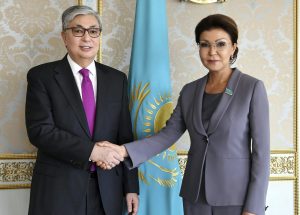In remarks delivered as exit polls indicated a landslide victory for Kazakhstan’s ruling party, Nur Otan, in the January 10 parliamentary elections, First President Nursultan Nazarbayev highlighted unity and continuity. Nazarbayev, who leads Nur Otan, and around whom Kazakhstan’s political universe rotates, said, “Kazakhstanis associate the further development of the country with our party.” He concluded that “Unity is our strength.”
On January 12, Nur Otan published the list of members it would be sending into the new parliament. Among the 76 is Dariga Nazarbayeva, Nazarbayev’s eldest daughter. Her election to the parliament is sure to re-stir rumors of future political designs.
Kazakhstan’s bicameral parliament consists of the (mostly) elected lower house, the Mazhilis. Of the Mazhilis’ 107 seats, 98 are elected via party lists to five-year terms. The remaining nine seats are filled by the Assembly of the People, a body with delegates from regional assemblies of the people intended to represent the many ethnic groups within Kazakhstan — its members are appointed by the president. The Senate is also mostly elected, with 34 of 49 indirectly elected by regional parliaments (two for each of the 14 regions and two each from the cities of Almaty, Nur-Sultan, and Shymkent). The remaining 15 Senate seats are appointed by the president. Notably, the Senate is (officially) non-partisan.
Nazarbayeva had held a seat in the previous parliament and in 2016 was appointed to the Senate. She rose to the position of speaker of the Senate following her father’s resignation from the presidency in March 2019. Current President Kassym-Jomart Tokayev had been speaker when Nazarbayev resigned, ascending to an interim presidency and then after a pro-forma election in June 2019 to the presidency proper.
But in May 2020, Nazarbayeva left the speaker role and lost her parliament seat, too. The turn of events was reported in several different fashions, which muddies our understanding of the political machinations. Reuters, for example, reported it as Nazarbayeva having “left her position as speaker of the Senate” while the Associated Press categorized her as being “dismissed” and “removed” via “an order from President Kassym-Jomart Tokayev.” Vlast.kz reported that her powers were “terminated” via presidential decree.
It was unclear whether Nazarbayeva had been forced out or resigned. And that assessment matters: Either Tokayev was trying to seize control, or curb Nazarbayeva’s ambitions, or as I’ve commented elsewhere, the Nazarbayevs as a political unit figured it prudent to be at least officially one step removed from power as Kazakhstan faced down the coronavirus pandemic. There were a few scandals percolating too, linked to Nazarbayeva, and one cannot rule out “a little of everything” as the ultimate reason.
Nazarbayeva’s return to parliament is another piece of information to take into consideration for understanding not just the political machinations of 2020, but the future course of politics to cone.
Nur Otan secured 71 percent of the vote on January 10, followed by Ak Zhol with 11 percent and the People’s Party (formerly the Communist People’s Party) with 9 percent. Those percentages translate into 76, 12, and 10 seats respectively in the 107 member lower chamber. (Reminder: the remaining nine seats will be filled by the Assembly of the People). Astute trackers of the Kazakh parliament will note the slight changes: Nur Otan loses eight seats, Ak Zhol gains five, and the People’s Party gains three. But it remains Nur Otan’s circus.

































